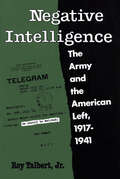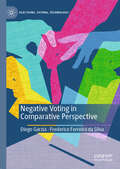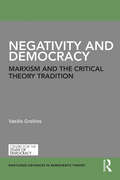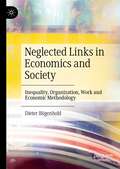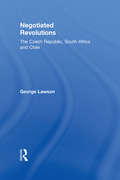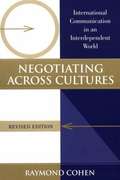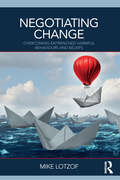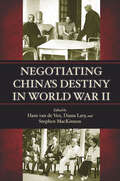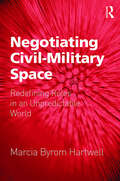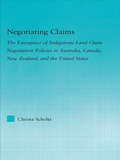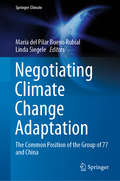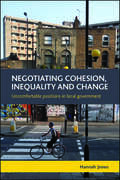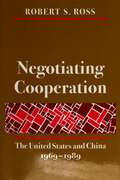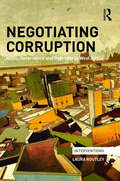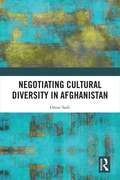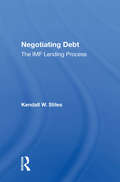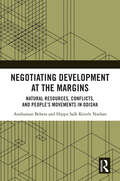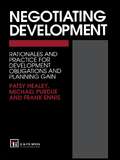- Table View
- List View
Negative Emotions and Transitional Justice
by Mihaela MihaiVehement resentment and indignation are pervasive in societies emerging from dictatorship or civil conflict. How can institutions channel these emotions without undermining the prospects for democracy? Emphasizing the need to recognize and constructively engage negative public emotions, Mihaela Mihai contributes theoretically and practically to the growing field of transitional justice. Drawing on an extensive philosophical literature and case studies of democratic transitions in South Africa, South America, and Eastern Europe, her book rescues negative emotions from their bad reputation and highlights the obstacles and the opportunities such emotions create for democracy. By valorizing negative emotions, either through the judicial review of transitional justice bills or the criminal trials of victimizers, institutions realize the value of respect and concern for all while contributing to a culture that is hospitable to democracy.
Negative Intelligence: The Army and the American Left, 1917-1941
by Roy Talbert Jr.During World War I, in the period of the Red Scare, and throughout the Great Depression, the army's domestic spy agency mounted an extensive surveillance campaign focused on civilians and groups deemed subversive. Negative Intelligence traces the fascinating and astonishing story of military espionage on the home front. Created by Major General Ralph H. Van Deman in 1917, the Negative Branch of Military, or MI, spied on American reformers in a program of civilian surveillance that surpassed even that of the Department of Justice's Bureau of Investigation. Among the targets were the Industrial Workers of the World, the American Civil Liberties Union, and “Negro Subversion.” Documentation of MI's program of domestic espionage is from recently opened Military Intelligence archives. Closely allied with private vigilante groups, the Army conducted illegal raids, made illegal arrests, subjected many citizens to interrogation, and developed an elaborate filing system for its dossiers. After World War I the hysteria continued, with MI's direct focus beamed upon a new enemy, the Bolsheviki. Although MI's abuses have been overshadowed by those of the Department of Justice, army espionage was in many ways more aggressive than its civilian counterpart. Negative Intelligence documents these abuses and shows how until 1921 the attempts to restrain MI's work failed. After this time, with limited staff and funding MI could do no more than maintain close liaison with private super-patriotic groups. However, the coming of the Great Depression fired up the rebirth of the army's civilian espionage programs. Then as World War II approached, internal security once again became a national policy, and J. Edgar Hoover of the Federal Bureau of Investigation moved his powerful network into the supreme position of domestic spying.
Negative Liberties: Morrison, Pynchon, and the Problem of Liberal Ideology
by Cyrus R. K. PatellSince the nineteenth century, ideas centered on the individual, on Emersonian self-reliance, and on the right of the individual to the pursuit of happiness have had a tremendous presence in the United States--and even more so after the Reagan era. But has this presence been for the good of all? In Negative Liberties Cyrus R. K. Patell revises important ideas in the debate about individualism and the political theory of liberalism. He does so by adding two new voices to the current discussion--Toni Morrison and Thomas Pynchon--to examine the different ways in which their writings embody, engage, and critique the official narrative generated by U. S. liberal ideology. Pynchon and Morrison reveal the official narrative of individualism as encompassing a complex structure of contradiction held in abeyance. This narrative imagines that the goals of the individual are not at odds with the goals of the family or society and in fact obscures the existence of an unholy truce between individual liberty and forms of oppression. By bringing these two fiction writers into a discourse dominated by Ralph Waldo Emerson, Isaiah Berlin, John Rawls, George Kateb, Robert Bellah, and Michael Sandel, Patell unmasks the ways in which contemporary U. S. culture has not fully shed the oppressive patterns of reasoning handed down by the slaveholding culture from which American individualism emerged. With its interdisciplinary approach, Negative Liberties will appeal to students and scholars of American literature, culture, sociology, and politics.
Negative Voting in Comparative Perspective (Elections, Voting, Technology)
by Diego Garzia Frederico Ferreira da SilvaWhy do some people conceive their vote choices as mostly against, rather than for a given party/candidate? Who are these negative voters? What macro-level conditions favor the development of negative voting? This volume provides answers to these questions through the first comparative assessment of negative voting in contemporary democracies. It presents a composite theoretical framework for the analysis of negative voting and tests it extensively on originally collected survey data from Canada, France, Germany, the Netherlands, and the United States. Examining negative voting as a possible behavioral consequence of affective polarization and negative partisanship, this study sheds light on the electoral implications of increasingly antagonistic attitudes among the electorate.
Negativity and Democracy: Marxism and the Critical Theory Tradition (Routledge Advances in Democratic Theory)
by Vasilis GrolliosThe current political climate of uncompromising neoliberalism means that the need to study the logic of our culture—that is, the logic of the capitalist system—is compelling. Providing a rich philosophical analysis of democracy from a negative, non-identity, dialectical perspective, Vasilis Grollios encourages the reader not to think of democracy as a call for a more effective domination of the people or as a demand for the replacement of the elite that currently holds power. In doing so, he aspires to fill in a gap in the literature by offering an out-of-the-mainstream overview of the key concepts of totality, negativity, fetishization, contradiction, identity thinking, dialectics and corporeal materialism as they have been employed by the major thinkers of the critical theory tradition: Marx, Engels, Horkheimer, Lukacs, Adorno, Marcuse, Bloch and Holloway. Their thinking had the following common keywords: contradiction, fetishism as a process and the notion of spell and all its implications. The author makes an innovative attempt to bring these concepts to light in terms of their practical relevance for contemporary democratic theory.
Neglected Links in Economics and Society: Inequality, Organization, Work and Economic Methodology
by Dieter BögenholdThis book deals with the Neglected Links in economics and society. These neglected links are the inner bonds and lines which keep the society and economy together and are almost interconnected although they are very often treated and discussed separately in different discourses. Contemporary discussion has forgotten to think universally and to integrate items into one common field of observation. Instead, too often particular items are studied and discussed as being independent of each other without acknowledging a broader context. The book gives an exemplary instruction on how to treat reciprocal links and how to work in an interdisciplinary way, which tackles history, sociology and economics at least. By so doing, the book as also serves as an educational instruction for integrative and interdisciplinary science instead of recapitulating mono-disciplinary approaches. Discussion includes topics such as social and economic inequality research, limits of rationality, and orthodoxies and heterodoxies of economic research, as well as a discussion of the heroes of interdisciplinary thought.
Neglected Policies: Constitutional Law and Legal Commentary as Civic Education
by Ira L. StrauberIn Neglected Policies, Ira L. Strauber challenges scholars and critics of constitutional jurisprudence to think differently about the Constitution and its interpretation. He argues that important aspects of law, policies, and politics are neglected because legal formalisms, philosophical theories, the reasoning of litigators and judges, and even the role of the courts are too often taken for granted. Strauber advocates an alternative approach to thinking about the legal and moral abstractions ordinarily used in constitutional decision making. His approach, which he calls "agnostic skepticism," interrogates all received jurisprudential notions, abandoning the search for "right answers" to legal questions. It demands that attention be paid to the context-specific, circumstantial social facts relevant to given controversies and requires a habit of mind at home with relativism. Strauber situates agnostic skepticism within contemporary legal thought, explaining how it draws upon sociological jurisprudence, legal realism, and critical legal studies. Through studies of cases involving pornography, adoption custody battles, flag burning, federalism, and environmental politics, he demonstrates how agnostic skepticism applies to constitutional issues. Strauber contends that training in skeptical critique will enable a new kind of civic education and culture--one in which citizens are increasingly tolerant of the ambiguities and contradictions inherent in the law and politics of a pluralistic society. Using insights from the social sciences to examine the ways constitutional cases are studied and taught, Neglected Policies will interest scholars of jurisprudence, political science, and the sociology of law.
Negotiated Revolutions: The Czech Republic, South Africa and Chile
by George LawsonStraightforward histories of post-revolution States have all too often failed to provide sufficient context to rescue revolution, both as concept and practice, from the misplaced triumphalism of the contemporary world. In Negotiated Revolutions George Lawson marks a definitive departure in the study of radical political and socio-economic change, presenting a unique comparative analysis of three transformations from authoritarian rule to market democracy. Through the lens of international sociology the book critically considers the large scale processes of social and political revolution, bringing three apparently distinct transformations, from seemingly disparate authoritarian regimes and geographies, under a common rubric. With unique and novel conceptual analysis the book accurately locates both the potential and actuality of radical change in contemporary world affairs, processes usually mistakenly subsumed under the general framework of 'transitology'.
Negotiating Across Cultures: International Communication in an Interdependent World
by Raymond CohenFor this substantially revised edition of his 1991 book, Raymond Cohen has added two new chapters, updated previous examples, and added numerous recent ones, especially concerning U.S. trade agreements. Newly added cases include the negotiations over NAFTA, China's most-favored-nation status, the nuclear non-proliferation treaty, and the Okinawa bases. Cohen explores how cultural factors have affected U.S. dealings with Japan, China, Egypt, India, and Mexico. He demonstrates that there are two quite different models of negotiation: "low context," a predominantly verbal and explicit style typical of individualistic societies such as the United States, and "high context," a style associated with nonverbal and implicit communication more typical of traditionally interdependent societies.
Negotiating Arab-Israeli Peace: Patterns, Problems, Possibilities
by Neil Caplan Laura Zittrain EisenbergFifteen years since the publication of its second edition, this foundational text in the history of Arab-Israeli peacemaking endeavors has been updated to include developments from the past twenty-five years.Thoroughly revised and expanded, the third edition of Negotiating Arab-Israeli Peace examines the history of recurrent efforts to resolve the Arab-Israeli conflict since the 1970s and identifies a pattern of negative negotiating behaviors that repeatedly derail peacemaking efforts. In addition to updating all of the book's existing chapters with post-2010 sources and developments, authors Eisenberg and Caplan have added new chapters on the Arab Peace Initiative, the Annapolis Conference, the Kerry mission, and the Abraham Accords, as well as a conclusion that questions several core notions regarding the nature of the conflict, the possibility of its resolution, Arab-Israeli "normalization," and the viability of the two-state solution. An epilogue extends the book's framework into present-day crises in the region, specifically Hamas's 7 October 2023 attack on Israel and Israel's war against Hamas in Gaza. A companion website comprises nine appendices, among them 145 primary source documents, expanded notes, links to websites for maps, data and analysis, peace activities, and additional visual and documentary sources. Also online is a robust instructor's guide offering supplementary resources and ideas for assignments, research and classroom exercises, all of which draw upon and complement the themes running throughout the text. By measuring contemporary diplomatic episodes against the historical pattern of counterproductive negotiating habits, Negotiating Arab-Israeli Peace makes possible a coherent comparison of some eighty years of Arab-Israeli negotiations and offers readers a framework with which to assess the relative strengths and weaknesses of peace-making attempts—past, present, and future.
Negotiating Armenian-Azerbaijani Peace: Opportunities, Obstacles, Prospects (Post-Soviet Politics)
by Ohannes GeukjianConflict resolution, conflict management and conflict transformations are major themes in this unique book which examines, explores and analyses the mediation attempts of the Organization for Security and Cooperation in Europe in the Nagorno-Karabakh conflict. Ohannes Geukjian shows the most striking characteristic of a protracted internal conflict such as this is its asymmetry and explains that, without meeting basic human needs like identity, recognition, security and participation, resolving any protracted social conflict is very difficult. The Armenian Azerbaijani case demonstrates how official diplomacy may not be able to solve protracted internal conflicts as, without addressing the real causes of the problematic relationship, attempts at peace making will always be sporadic and the space for mutual understanding and compromise shrink. Geukjian shows that conflict transformation has a particular salience in asymmetric conflicts such as this where the goal is to transform unjust relationships and where a high degree of polarisation between the disputants has taken root. Using the Nagorno-Karabakh case, this book focuses on the anatomy and causes of deadlock in negotiations and highlights the many difficulties in achieving a breakthrough.
Negotiating Bioethics: The Governance of UNESCO’s Bioethics Programme (Genetics and Society)
by Adèle LangloisA PDF version of this book is available for free in Open Access at www.tandfebooks.com. It has been made available under a Creative Commons Attribution-Non Commercial-No Derivatives 3.0 license. The sequencing of the entire human genome has opened up unprecedented possibilities for healthcare, but also ethical and social dilemmas about how these can be achieved, particularly in developing countries. UNESCO’s Bioethics Programme was established to address such issues in 1993. Since then, it has adopted three declarations on human genetics and bioethics (1997, 2003 and 2005), set up numerous training programmes around the world and debated the need for an international convention on human reproductive cloning. Negotiating Bioethics presents Langlois' research on the negotiation and implementation of the three declarations and the human cloning debate, based on fieldwork carried out in Kenya, South Africa, France and the UK, among policy-makers, geneticists, ethicists, civil society representatives and industry professionals. The book examines whether the UNESCO Bioethics Programme is an effective forum for (a) decision-making on bioethics issues and (b) ensuring ethical practice. Considering two different aspects of the UNESCO Bioethics Programme – deliberation and implementation – at international and national levels, Langlois explores: how relations between developed and developing countries can be made more equal who should be involved in global level decision-making and how this should proceed how overlap between initiatives can be avoided what can be done to improve the implementation of international norms by sovereign states how far universal norms can be contextualized what impact the efficacy of national level governance has at international level
Negotiating Boundaries
by Polly WildingThe favelas (slums) of Rio de Janeiro provide an ideal case study since they are renowned for high levels of police and gang violence resulting in high death rates among young black men, causing both outrage and fear. This book foregrounds women's experiences and how different forms of violence overlap and reinforce one another.
Negotiating Change: Overcoming Entrenched Harmful Behaviours and Beliefs
by Mike LotzofBehaviour change programs fail more often than they succeed. Failure is avoidable, but not if we keep attempting change the same way. Negotiating Change is the culmination of decades of work with global corporations in ethics, communications, behaviour change and regulatory and social compliance. The book provides a text for corporate leaders, their advisors and academics and students from several disciplines to explain why the current approach to behaviour change and compliance fails, and documents why the author’s approach has been successful in more than 60 countries. The book synthesises research insights from evolutionary psychology, behavioural sciences, neuroscience and neurochemistry into a practical guide. It explains why systems for behavioural guidance and control based on beliefs, religions, ethics, cultures and the law are ineffective in our globalised, hyper-connected, multi-cultural world. The author proposes that harm, first introduced by Hippocrates to guide the practice of medicine, provides a more useful linguistic model to engage. Harm and the Harm Principles provide an objective, independent and universal measure for assessing behaviour, applying equally regardless of race, religion, gender, age or status. Harm is culturally neutral and operates independently of laws, philosophies or codes of conduct. Harm transcends geography and time. Corporations are particularly vulnerable as they operate not just across jurisdictions and cultures, but their behaviour is influenced by the very nature of incorporation, corporate structure and stock-market pressure. Negotiating Change contains tools for boards and senior executives who want to build a more trustworthy organisation. It will not stop bad people doing bad things, but at least the self-righteous mask of legality will be removed.
Negotiating China's Destiny in World War II
by Stephen R. Mackinnon Hans Van de Ven Diana LaryNegotiating China's Destiny explains how China developed from a country that hardly mattered internationally into the important world power it is today. Before World War II, China had suffered through five wars with European powers as well as American imperial policies resulting in economic, military, and political domination. This shifted dramatically during WWII, when alliances needed to be realigned, resulting in the evolution of China's relationships with the USSR, the U. S. , Britain, France, India, and Japan. Based on key historical archives, memoirs, and periodicals from across East Asia and the West, this book explains how China was able to become one of the Allies with a seat on the Security Council, thus changing the course of its future. Breaking with U. S. -centered analyses which stressed the incompetence of Chinese Nationalist diplomacy, Negotiating China's Destiny makes the first sustained use of the diaries of Chiang Kai-shek (which have only become available in the last few years) and who is revealed as instrumental in asserting China's claims at this pivotal point. Negotiating China's Destiny demonstrates that China's concerns were far broader than previously acknowledged and that despite the country's military weakness, it pursued its policy of enhancing its international stature, recovering control over borderlands it had lost to European imperialism in the nineteenth and early twentieth century, and becoming recognized as an important allied power with determination and success.
Negotiating Civil-Military Space: Redefining Roles in an Unpredictable World
by Marcia Byrom HartwellThis book begins discussion at a point where many civil–military conversations end. Hartwell identifies underlying dynamics, key issues, and challenges that civilian and military organizations encounter when negotiating their roles in real and virtual volatile environments. These include managing expectations, understanding organizational missions and cultures, building trust, and exploring different approaches to violence. The impact of applied technologies on decision making processes and interventions is discussed in terms of recent and future complex crises. Linking earlier history to current discussions, this study makes an important contribution by reframing issues and outlining strategies to avoid unintended consequences and more effectively protect civilians in future operations. While geographic focus is on the Middle East, Africa, Central Asia, and Asia-Pacific, the core issues are applicable to negotiating civil–military relationships in a wide range of environments.
Negotiating Claims: The Emergence of Indigenous Land Claim Negotiation Policies in Australia, Canada, New Zealand, and the United States (Indigenous Peoples and Politics)
by Christa ScholtzWhy do governments choose to negotiate indigenous land claims rather than resolve claims through some other means? In this book Scholtz explores why a government would choose to implement a negotiation policy, where it commits itself to a long-run strategy of negotiation over a number of claims and over a significant course of time. Through an examination strongly grounded in archival research of post-World War Two government decision-making in four established democracies - Australia, Canada, New Zealand, and the United States - Scholtz argues that negotiation policies emerge when indigenous people mobilize politically prior to significant judicial determinations on land rights, and not after judicial change alone. Negotiating Claims links collective action and judicial change to explain the emergence of new policy institutions.
Negotiating Climate Change Adaptation: The Common Position of the Group of 77 and China (Springer Climate)
by María del Pilar Bueno Rubial Linda SiegeleThis book discusses the history of the Group of 77 and China’s negotiating position on adaptation to climate change in the context of the United Nations Framework Convention on Climate Change (UNFCCC). It also addresses a number of questions that have arisen, such as: What was the process for constructing a collective position of the G77 and China on adaptation? Why is it worthwhile to negotiate in a group of such dimensions? What are the incentives for reaching the broadest common position on adaptation? What is the role of the leading coordinators, and how is this linked to the rotating annual Presidency of the G77 and China? And, how do the subgroups of the G77 participate in reaching this general position? Written by former and current adaptation negotiators from developing countries, the book offers various perspectives from the subgroups and leading coordinators of the G77 and China as well as other organizations. Furthermore, in contrast to previous analyses on climate change negotiations, which focus mainly on the behaviour or position of one group, it presents a unique approach based on the strength of collectivism in the G77 and China. The book appeals to practitioners and professionals as well as scientists in climate change management and policy, impacts and adaptation, international relations, as well as diplomacy and development.
Negotiating Cohesion, Inequality and Change: Uncomfortable Positions in Local Government
by Hannah JonesHow are multiculturalism, inequality and belonging understood in the day-to-day thinking and practices of local government? Examining original empirical data, this book explores how local government officers and politicians negotiate 'difficult subjects' linked with community cohesion policy: diversity, inequality, discrimination, extremism, migration, religion, class, power and change. The book argues that such work necessitates 'uncomfortable positions' when managing ethical, professional and political commitments. Based on first-hand experience of working in urban local government and extensive ethnographic, interview and documentary research, the book applies governmentality perspectives in a new way to consider how people working within government are subject to regimes of governmentality themselves, and demonstrates how power operates through emotions. Its exploration of how 'sociological imaginations' are applied beyond academia will be valuable to those arguing for the future of public services and building connections between the university and wider society, including scholars and students in sociology, social policy, social geography, urban studies and politics, and policy practitioners in local and central government. Winner of the BSA Philip Abrams Memorial Prize 2014
Negotiating Cooperation: The United States and China, 1969-1989
by Robert S. RossIn the 1970s and 1980s the United States and China developed cooperative relations to enhance security against the USSR. Conventional wisdom claims Washington and Beijing agreed to 'shelve' conflictual issues; where conflict occurred, diplomatic error or domestic politics are blamed. This book shows, however, that US-China cooperation was fragile precisely because of ongoing conflicts, notably that over Taiwan. The author disputes Kissinger's claim that only he and Nixon understood Taiwan's unimportance. China never found the US stance on Taiwan acceptable, and the issue required constant attention. The book shows how the two powers built cooperative relations despite Taiwan. It explains how negotiations were conducted, and why the two powers at times compromised and at times accepted the status quo. It examines why relations on occasion became acrimonious and why the acrimony subsided.
Negotiating Corruption: NGOs, Governance and Hybridity in West Africa (Interventions)
by Laura RoutleyNegotiating Corruption demands that we think again about corruption in Africa. It problematises the framing of African corruption as a phenomenon that emerges from a clash between two sets of norms. Moreover, it highlights the colonial legacies of this frame, which situates African corruption within continually recurring debates about the political inclusion or banishment of 'others'. NGOs are characterised as intermediaries between the local and the international, and between the state and the population. In both of these roles they are understood to reform governance by bringing about changes in culture and instituting bureaucratic norms. They have, therefore, been seen as part of the apparatus of a global liberal governmentality. This book complicates this portrayal and highlights the ambiguous role of liberal governmentality through an exploration of the 'grey practices' of the NGOs studied. These practices are 'grey' as they do not fit the pattern of virtuous NGOs holding the state to account described in development policy, yet at the same time they ensure that the state produces the outcomes that a fully-functioning state ought to. This enacting of oppositional and antagonistic elements is further unpacked in conversation with Homi Bhabha's concepts of negotiation and hybridity. Negotiating Corruption draws attention to both the limitations of current explanations of corruption in Africa and the problematic way in which they are framed. The book's detailed engagement with understandings of corruption within policy and academic debates will make it a useful resource for undergraduate teaching. It will also be of keen interest to researchers, academics, and postgraduate students who engage with the issues of corruption, NGOs, civil society, African politics, governmentality, and hybridity.
Negotiating Cultural Diversity in Afghanistan
by Omar SadrThis book analyses the problematique of governance and administration of cultural diversity within the modern state of Afghanistan and traces patterns of national integration. It explores state construction in twentieth-century Afghanistan and Afghan nationalism, and explains the shifts in the state’s policies and societal responses to different forms of governance of cultural diversity. The book problematizes liberalism, communitarianism, and multiculturalism as approaches to governance of diversity within the nation-state. It suggests that while the western models of multiculturalism have recognized the need to accommodate different cultures, they failed to engage with them through intercultural dialogue. It also elaborates the challenge of intra-group diversity and the problem of accommodating individual choice and freedom while recognising group rights and adoption of multiculturalism. The book develops an alternative approach through synthesising critical multiculturalism and interculturalism as a framework on a democratic and inclusive approach to governance of diversity. A major intervention in understanding a war-torn country through an insider account, this book will be of great interest to scholars and researchers of politics and international relations, especially those concerned with multiculturalism, state-building, nationalism, and liberalism, as well as those in cultural studies, history, Afghanistan studies, South Asian studies, Middle East studies, minority studies, and to policymakers.
Negotiating Debt: The Imf Lending Process
by Kendall W. StilesThis book aims to develop and test a model of International Monetary Fund (IMF) decision-making that will offer a better understanding of how the IMF applies its lending terms to individual countries such as Jamaica, Zaire, Sudan, India, United Kingdom, Turkey and Argentina.
Negotiating Development at the Margins: Natural Resources, Conflicts, and People’s Movements in Odisha
by Anshuman Behera Hippu Salk NathanThis book critically examines various facets of conflicts involving people and the state arising due to the uneven distribution of natural resources. It provides an overview of the people’s movements in Odisha, a resource-rich state in eastern India. Reflecting on the conceptual frameworks of conflict, it analyses violence, and struggle for rights over resources, and public policies around natural resources, alongside local strategies and governance. Drawing from extensive field surveys in the villages of Kalahandi and undivided Koraput districts in Odisha, this volume explores the sociopolitical and economical aspects of people’s movements instead of solely viewing them as political and security threats. The authors demonstrate the misappropriations of these movements by both the state and non-state actors for their vested interests. This book offers recommendations for policymakers to draw up a more ready response to mitigate and minimize the conflict and violence and implement equitable policies around land and resources. While doing so, the book also provides some primers to development perspectives, the role of natural resources and conditions under which the natural resources can result in conflict, and principles and practices to overcome such conflicts. The volume will be an indispensable read for researchers and students of social history, social reform, tribal and indigenous studies, postcolonial studies, exclusion studies, development studies, political sociology, and South Asian studies.
Negotiating Development: Rationales and practice for development obligationsand planning gain
by Frank Ennis F. Ennis P. Healey Prof Patsy Healey M. PurduePlanning gain is the legal process by which property development is linked to social provisions. This book examines the rationale for planning gain and development obligations and reviews the practice of development negotiation through a wide range of case histories.

